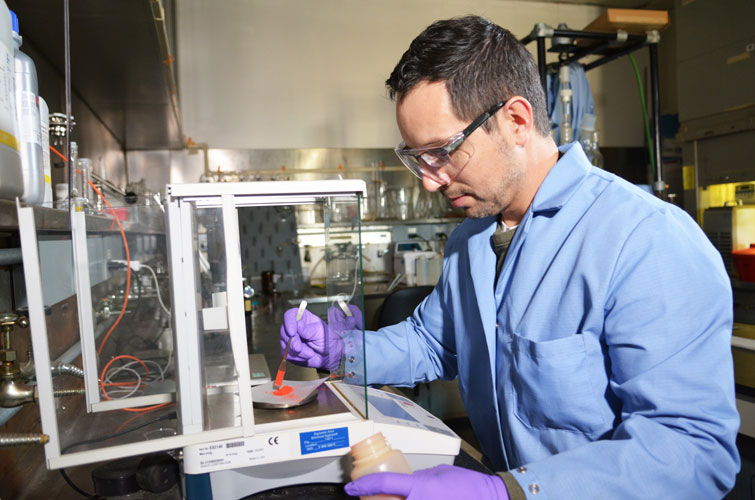Fireworks Go Green
By David Chavez
Colorful explosions require complicated chemistry. As chemists study the toxicology and air quality effects of fireworks, they can reduce potential environmental impacts.
July 1, 2016
Macroscope Chemistry Environment

CC0 photo from Life of Pix
When I was an undergraduate summer intern studying explosives at the Los Alamos National Laboratory, I, like many people, hadn’t really thought much about the long history of chemical and technological development behind fireworks. My first introduction to this fascinating area of science came when an entertainment company approached my mentor, Mike Hiskey, about the prospect of developing smoke-free or low-smoke pyrotechnics for outdoor fireworks displays. The main challenge at the time was the amount of smoke produced by the nightly shows, because it was drifting into neighboring communities. So in the name of science, we bought some commercial fireworks (gerbs, shells, flares, comets, star mines, etcetera) from a neighboring fireworks vendor, took their devices apart (don’t try this at home!) and studied them. We immediately began to realize how complex the chemistry of fireworks is, especially considering the hundreds of years of trial and effort it took to develop those we see today. At the same time, as we began to develop our low-smoke fireworks, we could see how new materials had tremendous potential to improve their properties—for example, to reduce smoke, improve colors, and lessen environmental impacts.
Fireworks often comprise mixtures of oxidizers and fuels that are ready to participate in combustion chemical reactions. When given enough energy to begin the reaction process, the oxidizers and fuels react to generate heat, smoke, and reaction products such as the gases carbon dioxide, carbon monoxide, water vapor, and nitrogen. The heat generated can be used to excite “coloring agents” or metal ion species that then emit the colored light we are accustomed to seeing at firework displays. The metal ions commonly used in pyrotechnics are sodium (yellow-orange), calcium (red-orange), barium (green), strontium (red), and copper (blue).
While fireworks are exciting to watch, they—like all explosives—come with risks. In 2014, fireworks were responsible for 11 deaths and more than 10,000 injuries, according to the U.S. Consumer Product Safety Commission. In addition to safety issues, fireworks can also pose health risks. As they are set off, fireworks can produce soot and smoke that temporarily reduce air quality around displays. Immediately afterward, fallout materials such as the coloring agents as well as unreacted fuels and oxidizers can fall back to the ground and contaminate soils or waterways. Some of these contaminants include perchlorate, which is thought to have some toxic effects on the thyroid, and heavy metals such as barium species that can be toxic to humans.
The use of organic materials containing chlorine atoms (including chlorinated rubbers and plastics such as polyvinyl chloride and parlon), added to pyrotechnic materials to enhance the purity of the color-producing species, also pose problems. The fallout from the combustion of these chlorine donors can potentially include toxic polychlorinated aromatics, biphenyls, and dioxins, all of which can then contaminate soils and waterways.
The potential health and environmental hazards created by some firework constituents and their combustion products have spurred increased regulation in both the civilian and military pyrotechnic arenas. As such, the United States has provided research funding to develop propellants, explosives, and pyrotechnics that are more environmentally friendly through programs such as the Environmental Quality Technology Program, the Environmental Security Certification Program, and the Strategic Environmental Research and Development Program. These programs have typically influenced research in military pyrotechnic applications such as illuminants (flares, star clusters, and comets), primers (materials that readily initiate combustion reactions and typically contain lead), and colored smoke compositions typically used for signaling on the battlefield.

Photograph by Kevin Roark, Los Alamos National Laboratory
Over the past few years, several advances have been made by the U.S. Department of Defense in providing technologies that have significantly improved the health and environmental impact of military pyrotechnics. Much of this work was initiated at the U.S. Armament Research and Development and Engineering center (ARDEC) in Picatinny, NJ. In the area of illuminants, significant advances have been made to address the fallout issues related to polychlorinated aromatic production from the use of chlorine donors in efficient color production. At ARDEC, chlorine-free compositions have been developed that either use alternate coloring agent sources, such as copper iodide (producing blue light), or modify the flame chemistry of strontium-based illuminants using high-nitrogen materials to achieve effective red light–producing compositions. High-nitrogen materials are chemical compounds that contain a large number of nitrogen atoms and relatively few atoms of carbon, hydrogen, or nitrogen. Because they contain little fuel (carbon and hydrogen), these materials burn very cleanly and produce little smoke or soot. Research into the replacement of barium compounds (producing green light) with boron-containing compositions has also been pursued. Our group developed energetic chlorine donors that display promising behavior to replace traditional polyvinyl chloride (PVC) or chlorinated rubber ingredients.
The removal of the perchlorate oxidizer from all areas of military pyrotechnics has also been a recent goal. Several high-performing, perchlorate-free, red light–emitting pyrotechnic illuminants have been developed using periodate as a replacement oxidizer, in addition to other methods. Because of this research, perchlorates have largely been removed from military pyrotechnics.
There is also a large amount of interest in the removal of lead primers from military pyrotechnic applications. Often, primers contain other harmful ingredients as well, such as barium and antimony compounds. One effort to replace compounds such as lead styphnate and lead azide resulted in the use of a copper compound known as DBX-1 (full name: copper(I) 5-nitrotetrazolate). This compound shows promise in being a “drop-in” replacement for lead-containing primers. Recently, a patent was granted to ARDEC for successfully developing primer compositions without antimony and barium compounds, according to my communication with chemist Jesse J. Sabatini.
Recent work on environmentally friendly pyrotechnics, performed by U.S. government scientists, has strong potential to cross over to the civilian pyrotechnics industry as well. Indeed, work performed by our group in the early 2000s using high-nitrogen compounds to produce low-smoke pyrotechnics was extended to commercial applications over the past several years. Numerous pyrotechnic devices, based on high-nitrogen, low-smoke pyrotechnic technologies, have been developed for indoor entertainment venues such as concerts and sporting events (including Superbowls, the Olympics, and so on).
One challenging aspect of developing better commercial fireworks displays is their reliance on the use of black powder to launch fireworks high into the sky. Black powder produces a significant amount of smoke and soot that can obscure the fireworks’ beauty and reduce air quality around the shows. Recently, two patents have been granted that describe the use of a low-smoke alternative. Although the technology still uses black powder, it allows 80 to 90 percent of the black powder to be removed.
As the toxicological profiles of pyrotechnic ingredients are studied further, the regulation of these materials will continue to increase. As an example, until recently red light–producing strontium hadn’t received the regulatory scrutiny of materials such as perchlorates or barium. But the U.S. Environmental Protection Agency recently announced a preliminary determination to regulate this element in drinking water. Such regulations will continue to drive scientific research into environmentally friendly ingredients for both civilian and military pyrotechnics. So at places such as ARDEC and Los Alamos National Laboratory, we’re continuing to develop new materials and technologies with an eye toward reduced environmental impact while at the same time ultimately maintaining or improving the performance of military pyrotechnics and the fireworks one might see at Fourth of July celebrations of the future.
American Scientist Comments and Discussion
To discuss our articles or comment on them, please share them and tag American Scientist on social media platforms. Here are links to our profiles on Twitter, Facebook, and LinkedIn.
If we re-share your post, we will moderate comments/discussion following our comments policy.